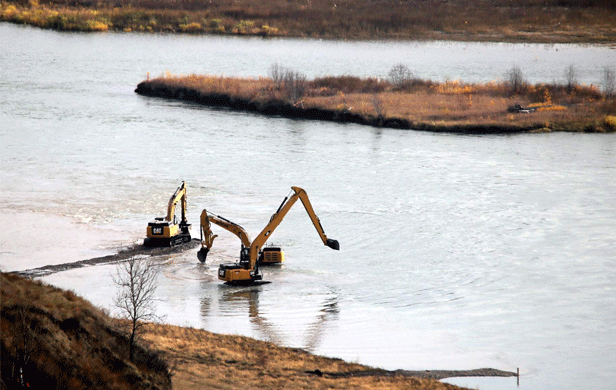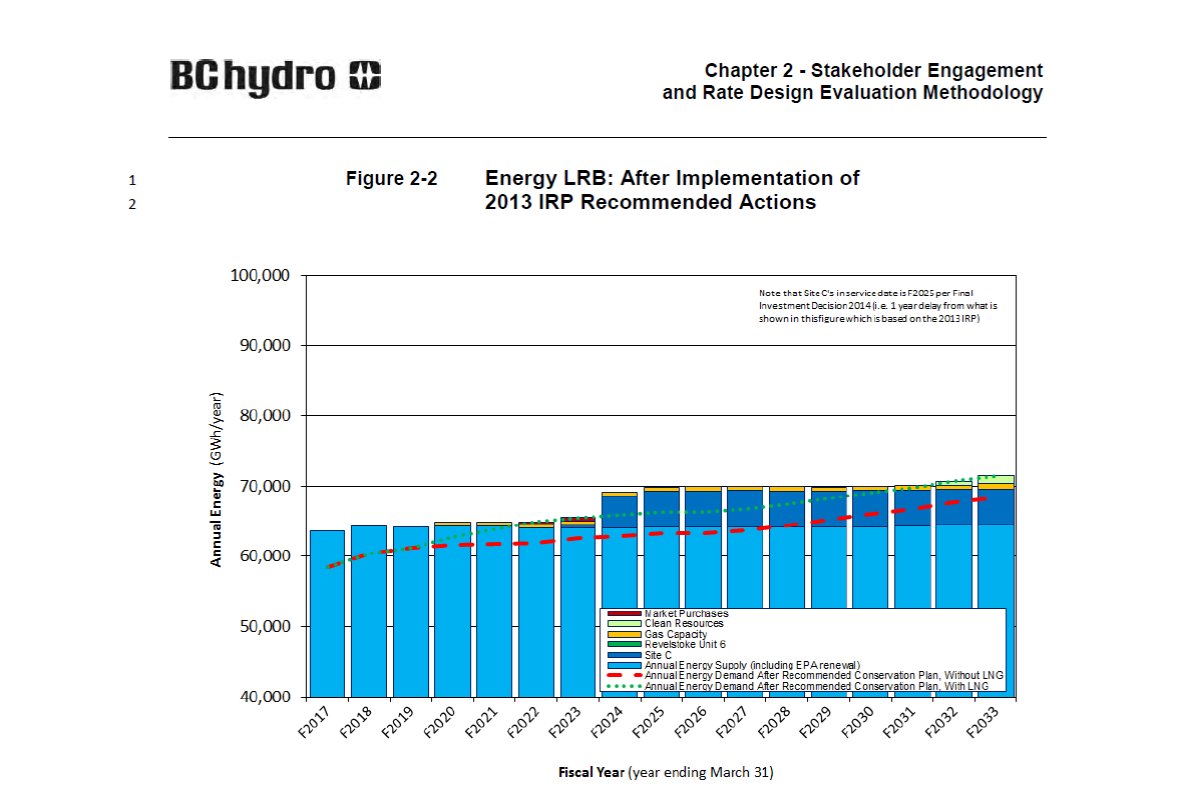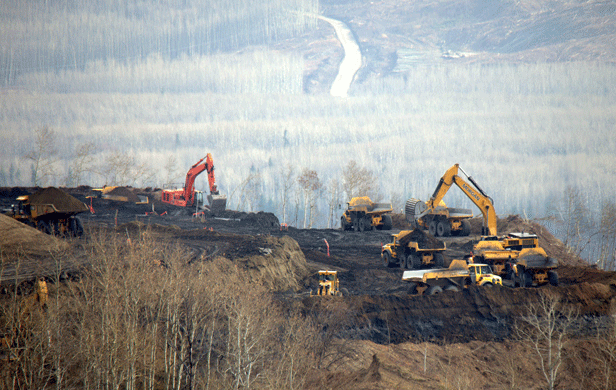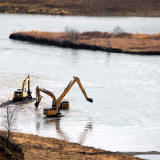
BC likely won’t need the power generated by Site C Dam until at least 2029, according to recent projections from BC Hydro’s Rate Design proposal, submitted to the BC Utilities Commission.

The figures underscore the finding by the Joint Review Panel into the project that the need for the power has not been demonstrated. Ironically, the BCUC, which is reviewing Hydro’s latest Rate Design proposal and is responsible for evaluating projects based on need and business case, was barred by the Liberal government from examining Site C.
Dam will leak dollars
To make matters worse, the power generated by the $9 Billion-plus project would have to be sold to neighbouring markets at a steep discount (something like ($35/Megawatt Hour vs. $100-plus to produce it), which will mean billions in losses to ratepayers and taxpayers. One leading energy expert – Dan Potts, retired head of the Association of Major Power Users’ of BC – predicts a $350 million annual loss to ratepayers from the unnecessary Site C.
Industrial demand down into foreseeable future
Hydro has a history of inflating demand with its forecasts – something we have well documented in these pages – but even it can’t see a need for Site C until more than a decade from now. The crown corporation attributes part of the decrease in future power demand to a decline energy used by big industry. “Forecast sales in the large industrial and commercial categories have decreased largely as a result of lower forecast customer load in the mining and pulp and paper sectors due to a delay in start-up and lower commodity market outlook,” Hydro acknowledges.

None of these trends – from the shuttering of pulp mills and saw mills, to a decline in mining activity – show any near or even medium-term sign of turning around. The only scenario under which Site C power is needed sooner than 2029 is if it were required to power LNG plants – which is highly unlikely given the sharp global downturn in the LNG market and the fact that most, if not all, LNG plants would choose to power the cooling process with gas-fired electricity as opposed to more expensive power from BC Hydro.
Should the demand scenario change in the coming decades, recent studies have shown that alternative renewable energy options would be cheaper and more environmentally sustainable – not to mention more scalable and quicker to bring online if and when need be.
Hasty work may lack permits
This all, once again, begs the question: why is the Liberal government so intent on bulldozing ahead with Site C construction – especially with a haste that may be violating a number of fish habitat protections?
Questions raised by local groups like the Peace Valley Landowners’ Association and Treaty 8 Tribal Association about federal permits for working in a fish-bearing river have yet to be answered by BC Hydro. Referring to the image at the top of this story, taken yesterday, showing two backhoes working directly in the river, the PVLA’s Ken Boon asks again, “Do they have the required federal permits to do this in the river? One would expect they do, but I and others having been pushing for an answer to this simple question, with no firm answers. We have been told they do not.”


Damien, I know this is a few months late — but I just read this piece by “A Chemist in Langley.” He claims to be looking at BC’s energy needs from a nonpartisan stance.
In addressing the goals of Paris 2016, he says, “To replace the energy currently provided by gasoline and diesel fuels only, we would need to find the energy equivalent to almost 15 Site C dams! [I later estimated that efficiency gains associated with electrifying transportation could bring that number down to 9].
Remember we have only been talking liquid fuels here. For a 100 per cent fossil fuel-free B.C., we would also need to replace the natural gas used mostly for industrial purposes and for home and water heating. That would represent another 16 Site C dam equivalents.”
That’s a LOT of dams! I’d say the Fraser wouldn’t be safe, if Blair (the chemist) is correct in his calculations — and Hydro stays on its river-only theme.
Better to find a lot of efficiencies first — but if his calculations are anywhere near correct, we have a lot of work to do, to replace our carbon appetite. Nuclear, anyone?
I’d like to hear your take on the chemist’s blog: https://achemistinlangley.wordpress.com/2016/01/03/a-non-partisan-look-at-british-columbias-energy-picture-in-light-of-the-paris-agreement/
We have to put a stop to Site C at all costs!! It makes absolutely no sense to continue destroying good, fertile land. Chrispy has been sniffing too much happy gas again.
The BC government ‘needs’ the economy to grow infinitely – that’s how they plan to deal with the massive debt they have taken on.
Debt is measured as debt/GDP ratio, so if GDP grows along with debt growth, the ratio remains the same.
Projects like Site C and LNG exports are seen by the govt as ways to grow the economy, even if they don’t make economic sense.
Infinite growth every year is exponential growth, so is mathematically impossible.
“Site C not needed until at least 2029, BC Hydro’s own numbers show”
And as anyone who has delt with the Smart Meter issue will tell you,
BC Hydro.. lies…all the time.
BC Liberal cronies and corporate sponsors must always be provided with a positive cash flow. Come election time they scratch government’s back. It’s just that easy.
Dictatorial governments don’t require permits. Bullying and ignoring laws provides a satisfactory facsimile.
You’re welcome
ftp://ftp.geobc.gov.bc.ca/publish/Regional/FortSt.John/Site_C_Referral/Consultation%20Packages/
ftp://ftp.geobc.gov.bc.ca/publish/Regional/FortSt.John/Site_C_Referral/Consultation%20Packages/Bundle1%20Permits%20Referral/
ftp://ftp.geobc.gov.bc.ca/publish/Regional/FortSt.John/Site_C_Referral/Consultation%20Packages/Bundle1%20Permits%20Referral/Dam%20Site%20Component%20Application/
The question is about federal permits, not provincial, Grump.
“Do they have the required federal permits to do this in the river?” Seems like a fairly simple question and response to me. Whilst repairing my dock several years ago I had occasion to wheelbarrow some river gravel on the bank. Fisheries officers (c/w exposed firearms) threatened me with immediate arrest if I did not cease and desist ‘placing deleterious material within the river channel’. This even though I had approval to do the repairs! Even though the ‘deleterious material’ originated within the river channel!
(I ceased and desisted, rather than become a taxpayer burden in the local jail.)
If the two backhoes cannot produce permits they should be shut down immediately (by fisheries officers).
Irrespective of permits and permission, why the urgency to defile the landscape?
How can the government render the BC Utilities Commission powerless?
Who (yes, which person – Bill Bennett says he’s just ‘following orders’ -) has the authority, and intelligence, to insist this ill-advised venture proceed in face of the various pending court challenges against it? Surely not Christy? Okay, maybe the authority, but intelligence?
And the final salt-in-the-wound question, why the proliferation of Alberta contractors? Who is monitoring the receipt of PST collections on equipment, fuel and supplies? Grande Prairie is just as close as Fort St. John, and 7% cheaper.